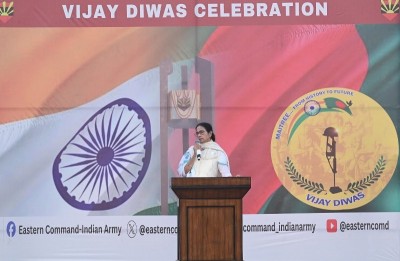December 19, 2024 04:44 (IST)

Bihar village declares independence from darkness
Dharnai, Bihar, July 20 (IBNS) Even as more than 300 million people still wait for electricity in India, Dharnai in Bihar declared itself energy-independent Sunday with the launch of Greenpeace’s solar-powered micro-grid. The 100 kilowatt (kW) micro-grid currently provides quality electricity to more than 2,400 people living in Dharnai village in Bihar’s Jehanabad district.
“While India was growing leaps and bounds, we were stuck here for the last 30 years, trying everything in the book to get electricity. We were forced to struggle with kerosene lamps and expensive diesel generators. But now I can proudly say that Dharnai is a leader in innovation. We have established our identity as an energy self-sufficient village and can compete with the country in its race to growth,” said Kamal Kishore, a resident of Dharnai.
Costing Rs. 3 crore, the solar-powered micro-grid is a comprehensive, first-of-its-kind enterprise that provides 24x7 electricity to more than 450 households and 50 commercial establishments.
This includes 70 kW for electricity generation and 30 kW for 10 solar-powered water pumping systems of three horsepower each. Built within three months and on a test-run since March, the quick-to-install micro-grid also takes care of 60 street lights, energy requirements of two schools, one health centre, one Kisan Training Centre (Farmer Training Centre) and 50 commercial establishments. It gives the village the mandate to not just a better life but also an ambition.
A quarter of the global population without access to electricity comprise the poor in India, where more than a third of the rural population lacks access to electricity. The decentralised, expandable and sustainable approach of the micro-grid provides that critical catalyst to power the new growth centres of India like Dharnai as well as bridge the deficit in urban areas. It is also a solution that can plug into the current government’s focus on using solar power for energy access to every household by 2019.
“Even as the government is preoccupied with blaming the civil society for stopping energy projects, here is a village that has created its own energy pathway through an alternate model of sustainable energy. The coal-fired and nuclear-fired power plants of the country will not be able to reach the Dharnais of the country. Nor will they be able to address global climate concerns and India’s commitments towards those concerns. India needs to seriously reconsider its energy strategy and prioritise renewable energy for social and climate justice,” said Samit Aich, Executive Director, Greenpeace India, at the launch of the micro-grid attended by more than 3,000 villagers and community leaders from 25 villages. Also present at the launch were representatives from partner organisations CEED and Basix.
The micro-grid is operated in association with BASIX, a livelihood promotion institution as well as CEED, which is a network of NGOs and think-tank organisations in Bihar to support renewable energy development in the state.
The micro-grid has been set up with the approval and conformity of the people of Dharnai. So while it is a 100 kW system as of now, it can be expanded to meet the advanced requirements of the people.
“The micro-grid intends to be the answer to the intense policy and vision paralysis that India’s energy sector faces today. The towns and villages of Bihar have been deprived of energy for decades now and we feel this is where the micro-grid can be the connect. We urge the Bihar government to follow and replicate this model,” said Naveen Mishra of Centre for Environment and Energy Development (CEED).
Greenpeace appeals to the government of Bihar to recognise decentralised renewable energy systems (DRES) like the Dharnai model for replicating and upscaling to provide energy to the dark villages of Bihar and create adequate regulatory structure for promotion of similar models.
Image: Greenpeace
Support Our Journalism
We cannot do without you.. your contribution supports unbiased journalism
IBNS is not driven by any ism- not wokeism, not racism, not skewed secularism, not hyper right-wing or left liberal ideals, nor by any hardline religious beliefs or hyper nationalism. We want to serve you good old objective news, as they are. We do not judge or preach. We let people decide for themselves. We only try to present factual and well-sourced news.
Support objective journalism for a small contribution.
Latest Headlines
New Parliamentary Committee on 'One Nation One Election' to have Anurag Thakur, Priyanka Gandhi
Wed, Dec 18 2024
PM Modi condoles loss of lives in Mumbai boat mishap
Wed, Dec 18 2024
13 killed as Navy speedboat collides with ferry near Mumbai
Wed, Dec 18 2024
My quitting won't help Congress: Amit Shah on resignation demands amid Ambedkar row
Wed, Dec 18 2024
Indian PM Narendra Modi to visit Kuwait this weekend
Wed, Dec 18 2024







